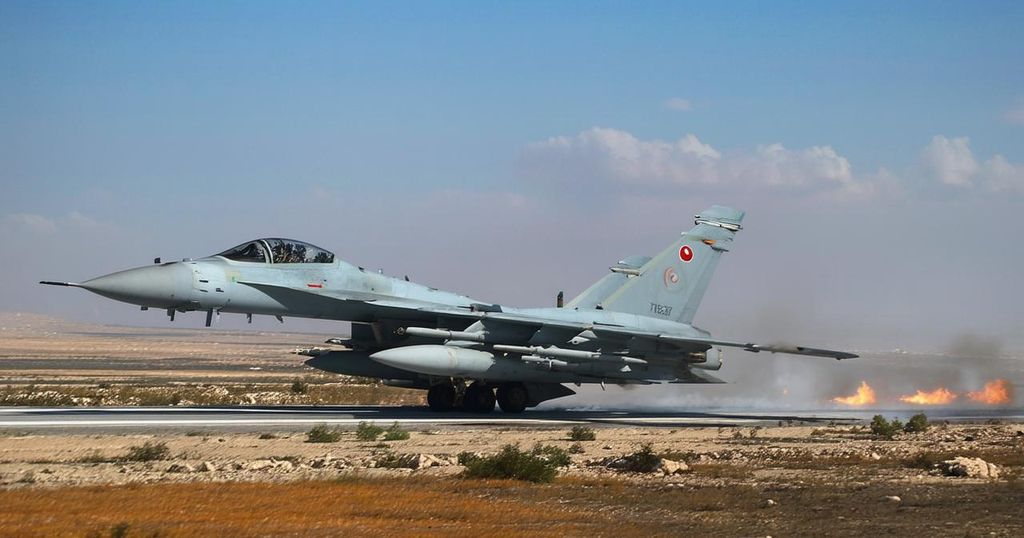Turkey Strikes Back: Airstrikes on Kurdish Regions Following Attack in Ankara
Turkey launched airstrikes in Kurdish regions of Syria and Iraq late Wednesday in retaliation for an attack in Ankara that killed four. The Syrian Democratic Forces (SDF) reported 12 fatalities, including two children, due to these strikes. SDF commander General Mazlum Abdi condemned the attacks as indiscriminate, while approximately 900 U.S. forces remain active in the area amidst ongoing tensions and peace negotiations involving the PKK and Turkish government.
Turkey has commenced airstrikes in Kurdish-held territories of Syria and Iraq late Wednesday, acting in retaliation for a deadly assault on a state-owned defense manufacturer in Ankara that resulted in the deaths of four individuals and injuries to over a dozen others. The Turkish administration has attributed blame for this attack to the Kurdistan Workers’ Party (PKK), which President Recep Tayyip Erdogan described as a “nefarious” act targeting the Turkish Aerospace Industries situated outside the capital. Footage verified by CBS News has shown significant damage to the electrical infrastructure regions of Kobani and Qamishli, the latter being a key city within the semi-autonomous Kurdish-controlled area in northeast Syria. The Syrian Democratic Forces (SDF), who are considered vital partners of the United States in combating ISIS, reported on Thursday that the Turkish air and artillery strikes have led to the demise of 12 individuals, among whom were two children, while 25 others have sustained injuries. The Turkish Ministry of Defense reported targeting 47 “terrorist targets” in both Syria and Iraq. General Mazlum Abdi, the commander of the SDF, condemned the Turkish airstrikes as indiscriminate, stating that they impacted civilian infrastructures like hospitals in northeast Syria. He outlined the SDF’s continuous readiness for dialogue while also affirming their commitment to defend their populace and territory. Currently, approximately 900 U.S. forces remain in the region as part of the international coalition combating ISIS, with the SDF acting as America’s primary ally on the ground in northeast Syria. Neither the U.S. Department of Defense nor its Central Command had released a statement pertaining to the attack in Ankara or the subsequent Turkish airstrikes by Thursday morning. The Turkish government regards the SDF and its civilian component, the YPG, as being closely linked to the PKK, which has been waging a long-term insurgency in Turkey. The PKK, recognized as a terrorist organization by both Turkey and the United States, is largely based in the Qandil mountains of northern Iraq, which Turkey routinely attacks. No group has acknowledged responsibility for the assault in Ankara, which coincides with renewed negotiations between the Turkish government and the imprisoned leader of the PKK, Abdullah Ocalan, who has been incarcerated in Turkey for over two decades. “Ocalan is prepared to end the violent conflict that has been ongoing since the mid-1980s,” as conveyed by Omer Ocalan, the imprisoned leader’s nephew and a member of Turkey’s parliament. Additionally, a noteworthy ally of President Erdogan, Devlet Bahceli, leader of the Nationalist Movement Party, has invited Ocalan to address parliament and has suggested the possibility of parole in exchange for the disbandment of the PKK.
The Kurdish conflict, particularly involving the PKK, has historical roots in Turkey and has led to decades of violence and tension within the region. The PKK has been designated a terrorist organization by both Turkey and the United States as it continues its insurgency seeking greater autonomy for Kurdish populations in Turkey. The dynamics of U.S. involvement in the region, particularly through support for the SDF in the fight against ISIS, adds complexity to the situation, particularly as Turkey perceives these groups as linked to the PKK. With ongoing negotiations for peace, the latest attack has potential implications for the fragile peace talks and the geopolitical landscape of the region.
In conclusion, Turkey’s recent airstrikes in response to an attack on a government facility highlight the ongoing tension between the Turkish government and Kurdish groups, particularly the PKK. The attacks have significantly impacted civilian populations and infrastructure in Kurdish-held areas of Syria and Iraq. As negotiations for peace progress, the retaliatory actions taken by Turkey may further complicate efforts to de-escalate the conflict and solidify alliances in the region, particularly regarding U.S. interests and involvement against ISIS.
Original Source: www.cbsnews.com




Post Comment